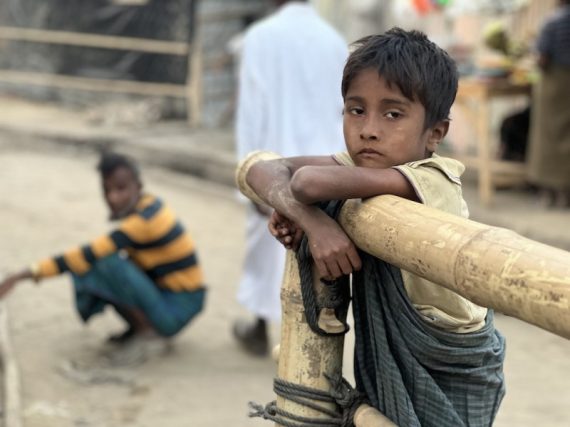A
s the world is witnessing blatant atrocities against Palestinians in Gaza, it also bore witness to hundreds of displaced Rohingya children, women, and men being returned to sea just hours after disembarking from a boat in Aceh, Indonesia on December 27. It is widely known that the Rohingya are victims of genocide and ethnic cleansing in Myanmar. In a new escalation in 2017, 6,700 were killed while 740,000 were displaced.
The local population in Aceh is becoming increasingly weary of the burden of hosting refugees. According to media reports and records from the United Nations Refugee Agency (UNHCR) and the Indonesian Ministry of Foreign Affairs (MFA), Aceh has received more than 4,000 Rohingya since 2008. A surge in the number of arrivals was recorded during the pandemic in 2020-2022, reaching 1,155 people.
The influx of refugees from Myanmar to Indonesia has constantly increased in 2023. Since February 2023, MFA records show an increase of the number of refugees from Myanmar to Indonesia. The number has reached almost 2,000 refugees, as November and December 2023 marked the peak of arrivals with 1,534 Rohingya making their way to Indonesia. As of January 2024, there are already 170 new arrivals.
The Rohingya refugee influx over the past two months was not the only factor contributing to hundreds of students swarming the refugee shelter in the capital Banda Aceh on December 27. This led to the hasty military-backed expulsion of hundreds of Rohingya back to the sea. The complexity of the problem lies in the geopolitical buck-passing solutions that promote an anti-migrant atmosphere and narratives of refugees posing a national threat to Indonesia in the future. The problem is intensified by accumulated obscure government policies, the ineffectiveness of humanitarian organizations’ capacity programs, misinformation and propaganda on the internet, and the insecurities of higher-ups about the increasing cases of illegal human trafficking.
Coercion and mobilization
Many Acehnese condemned the action and suspected a systematic choreography. In a telephone conversation, local residents expressed their disappointment. “It has never been seen before (that) students’ anarchic protest would be able to convince the military to push the refugees back into the sea,” said a local resident in Banda Aceh who chose to keep his identity secret. “It seemed that only this morning they had the chance to put on green attire to chase the refugees out,” said another villager in an angry, cynical tone, indicating the use of university green attire to symbolize the force behind the act. Although the students have apologized, the damage has been done and the message of rejection has been sent.
An investigation by the state was launched a few days after the incident. It shows a series of efforts to systematically mobilize masses for expulsion, involving military personnel from Aceh. The students were promised a sum of 100-200 million rupiah ($6,500 to $13,000) for holding a demonstration against the Rohingya. No suspects have been named, other than the leader of the student demonstration. Scholars have suggested a pattern of top-down strategic anti-migration missions.
The use of coercion and money has exposed not only the accumulation of prejudices within the Acehnese people but also Indonesians at large. Strong changes were particularly clear in 2021 and 2022, where fear and hatred were manufactured through social media. Indonesians and Acehnese spread false information about the future plans of the Rohingya once their status improved. Such claims included, that those arriving in Aceh would steal land?, comparable to “Israel’s theft of Palestinian land”; that sharing the burden of state finances would displace the priority of the natives; that the Rohingya’ demand for a free and sustainable life with secure jobs and protection; the “lack of a culture of cleanness” among the Rohingya; and allegations of involvement in rape cases, drug abuse, and “being ungrateful.”
The South China Morning Post interviewed the protesters whose response was in sync with the spread of false information online. The Ministry of Communication and Information and the NGO Masyarakat Anti Fitnah Indonesia or Anti-defamation Society verified that the above accusations are false and exaggerated.
Social media, including several unverified accounts on YouTube, have spread misinformation by defaming powerful elites in Indonesia as encouraging the expulsion. The fake news had been circulating on social media for months before the incident. The untimely and insensitive public statement by elite society members about Indonesia being a non-signatory to the 1951 United Nations Refugee Convention and therefore deserving leeway in the blame game was greatly influential.
On December 20, Foreign Ministry spokesman Lalu Muhammad Iqbal claimed that Indonesia’s non-signatory status exempted the country from any responsibility for the lives of the Rohingya. He also blamed the illegal human trafficking in Indonesian waters and demanded the signatory countries of the 1951 Convention take responsibility.
Although emphasizing the moral burden of the plight of the Rohingya, Iqbal’s statement led to condemnation from various parties and helped a hoax gain momentum as his statement partly played a role in the student march on December 27.
Triggered buck-passing
Looking at the geopolitical buck-passing attitude towards the Rohingya in recent years, perhaps part of Iqbal’s statement could be applauded or at least arise some empathy. His stance was triggered by the increasing phenomenon of illegal human trafficking and the high probability that Bangladesh organizes the remigration of Rohingya refugees out of its country to evade responsibility.
This assumption is corroborated by a recent investigation, published on December 15, based on the testimonies of several arrested suspects. It reveals that the Bangladesh Security Camp and its navy captain were involved in human trafficking. They lured the Rohingya with promises of a better life and a safe destination with a fee ranging from 3 to 15 million rupiah ($193 to $965) per person. The money was then used to purchase boat engines, fuel, and food supplies for the journey. The profit was shared between the ship’s captain and the boat crew in Bangladesh’s Cox Bazaar. Prior to departure, the refugees’ names were listed on a paper with country destinations that included Indonesia, Malaysia, and Thailand.
Due to Indonesia’s weak maritime security, most of the refugees landed and sheltered in Aceh. There several cases of runaways were reported and linked to trafficking to various areas with better economic prospects in Sumatra, such as Tanjung Balai in North Sumatra, Dumai, and Riau. The Indonesian traffickers demanded 5-10 million rupiah ($321 to $643) for each refugee. Since 2015, there have been 23 cases related to human trafficking. Coordinating Minister for Political, Legal, and Security Affairs of Indonesia Mahfud MD has stated that people from the country are involved in the illegal Rohingya human trafficking around Indonesia.
The situation of the Rohingya in undeniably a complex and multidimensional problem. However, Indonesia holds a moral responsibility to actively engage in humanitarian rescue efforts, to prevent further anti-refugee discourse in social media, and to improve its maritime security through non-traditional security measures.
Recommended





